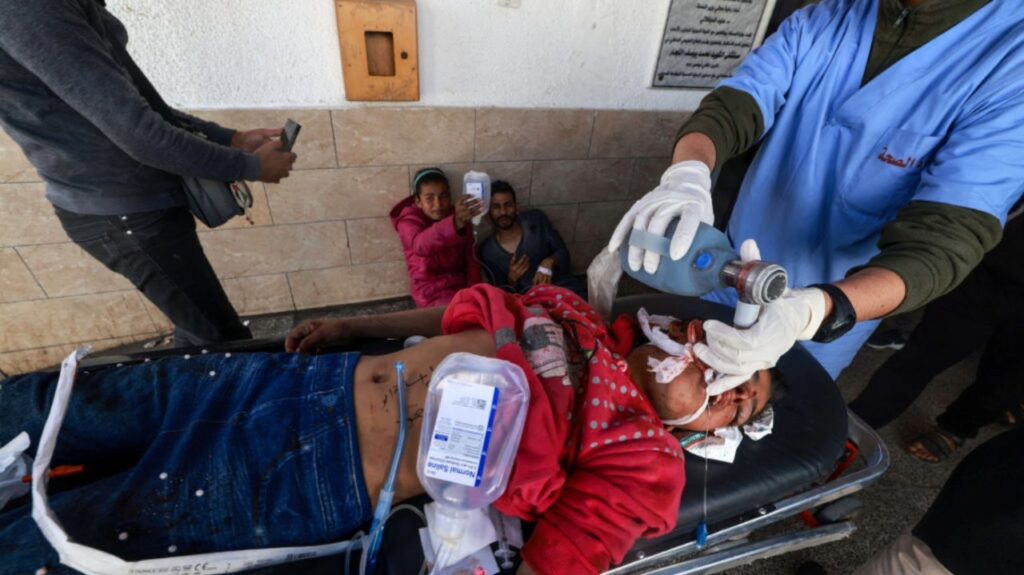The world took notice last week when Israeli forces attacked Al Shifa Hospital, Gaza's largest medical facility, killing at least 90 people. Two days earlier, first responders, including paramedics responding to a Russian missile attack on a civilian home in Odessa, were targeted and killed.
Health systems face ongoing threats in conflicts around the world.
In 2023, there will be nearly 2,000 attacks on health facilities and health workers, a record since the Coalition for Health in Conflict began reporting 10 years ago. Hundreds of healthcare workers have already died so far this year. This trend will continue until countries like the United States demand protection for healthcare workers everywhere.
During war, medical workers form the backbone of the rest of the health care system. Doctors and nurses in Gaza have been working nonstop and without pay for six months amid constant airstrikes. They had to care for their own families who were killed or mutilated. Project HOPE medical staff working at Al Aqsa Hospital in Deir Al Bala reported that all of the dozens of medical workers slept in one small room and ate only canned food.
Outside of hospitals, medical professionals utilize mobile medical units and pop-up medical tents to provide essential services such as prenatal care, routine childhood immunizations, and treatment of non-communicable diseases to displaced populations and isolated communities. We provide services. Without medical personnel, the death toll in any conflict would certainly increase exponentially.
But despite their heroic acts, they live and work in fear and anxiety every day.
Since violence erupted in Gaza six months ago, there have been more than 300 attacks on hospitals, primary care facilities, ambulances and medical workers. Unfortunately, this is nothing special. We have seen this happen repeatedly in recent and ongoing conflicts.
In Ukraine, Russia launched more than 1,000 attacks against hospitals, clinics, and medical workers. Nearly 950 health workers have died in Syria's 13-year war. In Tigray, Ethiopia, only 3 percent of all medical facilities are fully operational due to destruction, looting, relentless violence and mass displacement by militants. Sudan has reported more than 60 attacks on medical facilities, more than 200 violations against health workers, and 38 deaths of health workers since the civil war began in April last year.
Repeated acts of violence and assaults against health workers have raised concerns about their safety, and exacerbated staffing shortages in barely functioning health facilities.
Attacks combined with the weaponization of fuel, clean water, and food increase the risk of morbidity and mortality. In addition to shortages of basic supplies necessary for human life, lack of access to protected health services exacerbates the risk of outbreaks of potential diseases such as cholera.
As a global community, we cannot risk remaining unfazed and unaffected by attacks on health workers, regardless of the circumstances. Health workers must be afforded a high level of protection in times of conflict.
International humanitarian law (IHL) recognizes both the humanity and practicality of protecting health care from attack. IHL rules require combatants not to attack or obstruct hospitals, primary care centers, ambulances, or even injured or sick people themselves. This also applies if the facility is treating wounded combatants. Facilities can lose protection, but only in exceptional circumstances, such as when it is confirmed that a hospital has been used as a base to launch an attack. Actors who violate humanitarian law must be held accountable to maintain the law's effectiveness and value.
In recent years, as violence against health care has risen to the global agenda, there has been a proliferation of resolutions, commitments and declarations that violence against health care is unacceptable. But despite grand promises, there was little action. Impunity and lack of accountability have allowed these attacks to continue.
The United States will prohibit the supply of weapons to perpetrators of attacks on health care, support prosecutions of attacks on health care in the International Criminal Court, and model good practices for protecting health care through military doctrine. , become a leader in protecting the medical system during war. Changes to the law criminalizing training and providing medical assistance to terrorist suspects. Initiatives like bipartisan House Resolution 389, introduced by Rep. Ami Bera (D-Calif.) and Rep. Jen Quiggans (R-Va.), protect health care workers as part of building a resilient health care system. This is a first-of-its-kind initiative. step.

If the United States stands still, medical workers will continue to die and the entire medical system will collapse. Health workers around the world are entitled to support and protection to do their work for civilians caught up in conflict.
Rabbi Tovey is president and CEO of Project HOPE, a health and humanitarian organization that supports health services in approximately 30 countries, including conflict zones such as Gaza, Ukraine, and Sudan.
Leonard Rubenstein is a professor at the Johns Hopkins Bloomberg School of Public Health with the Center for Public Health and Human Rights and chair of the Coalition to Protect Health in Conflict.
Copyright 2024 Nexstar Media Inc. All rights reserved. This material may not be published, broadcast, rewritten, or redistributed.


